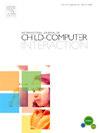Exploring STEM (science, technology, engineering and mathematics) toys in kindergarten: Teachers' pedagogical approaches, perspective and effect on Children's brain development: A systematic literature review
Q1 Social Sciences
International Journal of Child-Computer Interaction
Pub Date : 2025-04-05
DOI:10.1016/j.ijcci.2025.100736
引用次数: 0
Abstract
This systematic literature review explores pedagogical approaches of kindergarten teachers' to facilitate children's play with STEM toys. This review summarises teachers' perspectives on the utilisation of STEM toys in children studying in kindergarten and describes the outcomes of children's development resulting from playing with STEM toys. The present systematic literature search was performed in accordance with the PRISMA-2020 checklist. The search engines used were Google Scholar, PubMed, PubMed Central, Scopus, and other journal databases including ScienceDirect, Springer, Taylor & Francis etc. for papers published between 2010 and 2024. These searches yielded 2352 peer-reviewed articles. The application of the selection and rejection criteria led to the formation of a shortlisting 32 papers, following the initial evaluation. The findings revealed the various approaches that teachers can employ during play sessions with STEM toys while teaching. Kindergarten teachers take on the roles of facilitators and mediators, promote collaborative work, and encourage children to perform experiments and learn from failure. Furthermore, the findings of this study revealed that kindergarten teachers generally maintain favourable and constructive perspectives regarding the utilisation of STEM toys. The results underscore positive impacts on cognitive abilities of children like problem-solving and critical thinking, and socio-emotional skills like verbal communication from using STEM toys. Comprehensive teacher training is emphasised to identify methodologies that complement the technology, maximizing teaching-learning benefits for children's brain development.

探索幼儿园STEM(科学、技术、工程和数学)玩具:教师的教学方法、视角和对儿童大脑发育的影响:系统的文献综述
本文系统地探讨了幼儿园教师促进儿童玩STEM玩具的教学方法。这篇综述总结了教师对在幼儿园学习的儿童使用STEM玩具的看法,并描述了玩STEM玩具对儿童发展的影响。本系统文献检索是按照PRISMA-2020检查表进行的。使用的搜索引擎是谷歌Scholar、PubMed、PubMed Central、Scopus和其他期刊数据库,包括ScienceDirect、b施普林格、Taylor &;弗朗西斯等人在2010年至2024年间发表的论文。这些搜索产生了2352篇同行评议的文章。在初步评估之后,选择和拒绝标准的应用导致形成了32篇论文的入围名单。研究结果揭示了教师在教学过程中可以使用STEM玩具的各种方法。幼儿园教师扮演促进者和调解者的角色,促进合作,鼓励幼儿进行实验和从失败中学习。此外,本研究的结果显示,幼儿园教师普遍对STEM玩具的使用持积极和建设性的观点。研究结果强调了使用STEM玩具对儿童的认知能力(如解决问题和批判性思维)以及社会情感技能(如口头沟通)的积极影响。强调全面的教师培训,以确定补充技术的方法,最大限度地提高儿童大脑发育的教与学效益。
本文章由计算机程序翻译,如有差异,请以英文原文为准。
求助全文
约1分钟内获得全文
求助全文
来源期刊

International Journal of Child-Computer Interaction
Social Sciences-Education
CiteScore
7.20
自引率
0.00%
发文量
73
 求助内容:
求助内容: 应助结果提醒方式:
应助结果提醒方式:


